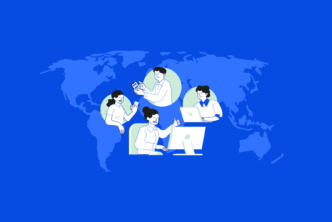2024 is the year of artificial intelligence, and news about it is spreading like wildfire. Microsoft is adding an AI-assisted feature to Windows 11, a significant AI push in the company’s most visible and hard-to-ignore product. Shares of Nvidia, a company that produces graphics processing units (GPUs) used for AI tasks, soared after the tech giant beat profit expectations. Finally, AI tools such as GitHub Copilot, Tabnine, and ChatGPT have already become integral to software development.
Moreover, computer scientists and research analysts predict AI will change how many industries conduct daily operations. Advanced algorithms, AI, and machine learning can solve complicated problems such as curing diseases, stabilizing our climate, and ending poverty.
A new report from MarketsandMarkets predicts that the global AI market will grow from $86.9 billion in 2022 to $407.0 billion by 2027. The worldwide AI market is expanding significantly, driven by the demand from enterprises to modernize customer service and improve business processes.
We have collected opinions from companies on future AI trends that will shape how they conduct market research, find the right talent, increase team productivity, and mitigate security risks.
Table of Contents
What business tasks and needs will be most affected by the development of AI?
Hiring and vetting candidates
In the future, AI will be used in hiring to analyze responses and gestures in interviews, verify resumes, and target advertising campaigns to reach desirable candidates.
Proponents of using AI in hiring also claim that it reduces bias. However, human rights activists argue that the use of AI can lead to inequality. For example, suppose a company with a predominantly white male workforce uses employee data to train a custom model. In that case, it may inadvertently create a screening process that favors white male candidates.
Yura Riphyak, CEO and founder of YouTeam, a staff augmentation marketplace:
“Personal computers, internet, smartphones, social media – every wave of technological change has transformed recruitment. But I believe that the change brought by AI will be the biggest.
If you look at the entire recruitment workflow, from writing a job description all the way to onboarding, you can see that every stage can be improved with generative AI. But when you think these are only the early days, you realize that the only choice left is to watch the revolution go by or join it.”
Market research and competitive analysis
AI can quickly process and analyze large amounts of unstructured data and predict future trends and customer behavior. In other words, AI provides market analysis and helps to make pricing decisions with accuracy and depth that would be impossible to obtain using traditional research practices.
The AI-driven revolution in qualitative research will make marketing even more personalized – technologies such as facial coding and sentiment analysis will analyze micro-expressions and identify emotions, helping researchers and marketers understand the emotional impact of campaigns and products on consumers. As a result, AI event activations will become more dominant, using this research data for the benefit of marketing efforts.
Andre Oentoro, founder of Breadnbeyond, an explainer video company:
“At our explainer video company, we pride ourselves on the craftsmanship of our videos, which are brought to life by our talented team of human animators.
However, we recognize the power of AI when it comes to generating ideas and analyzing the market. With a diverse clientele spanning various industries, AI helps us identify each industry’s popular animation styles, themes, and techniques. This saves us time and energy, especially in the research market process and conceptualization.
The technology makes it easier for us to stay attuned to the dynamic pulse of the market by identifying trends in audience reactions, preferences, and expectations. This enables us to align the videos with the ever-evolving demands of the client’s target audience.
With the help of the automation the AI brings, we ensure that the explainer videos we create resonate with viewers, making them more effective in delivering the desired impact and achieving the desired results.”
Team productivity
Teams increasingly use natural language processing (NLP) to learn new technologies and frameworks or identify anomalies in data structures. In the process, team members acquire the problem-solving, critical thinking, and linguistic skills that are the foundation for the effective use of NLP applications.
In addition, AI-powered smart assistants will help the HR department become a more strategic function. In the future, such assistants will extract information from performance review responses, make recommendations based on this data, and automate routine operations such as checking in with a new employee after the first month of work.
Gaurav Sharma, founder of Attrock, a digital marketing company:
“Artificial intelligence has revolutionized numerous facets of businesses, but one of its lesser-explored avenues is team management. As a manager, you can harness it to understand how well your team members are interacting with each other and identify any weak links. It also enables you to provide timely feedback to your teams, leading to better skills.
In addition, with the power of AI, you won’t have to spend a lot of time manually managing various team performance metrics. Instead, you’ll have the data and trends to make quick decisions to increase your team’s productivity.
Besides improving team productivity, AI also empowers growth hacking software. While there’s a learning curve to master its usage, you’d reap many benefits once you get the hang of it.”
Browse 500+ Dev Teams Available for Hire
Mitigating privacy risks
The data used to train AI systems may include sensitive information such as names, addresses, phone numbers, financial data, and medical records. In today’s world, where personal data breaches occur regularly across social media, messaging apps, VoIP phone systems and web services, the threat of unauthorized access to sensitive information in AI systems is no exception.
Another concern is the use of AI for surveillance and tracking. For instance, law enforcement agencies utilize facial recognition to identify suspects and protest organizers and track individuals in public spaces. Advanced systems can locate these individuals within seconds, raising questions about privacy rights and the potential abuse of these technologies.
Kristin Mack, associate consultant privacy at DataGuard, a compliance software company:
“Artificial Intelligence, especially language models like ChatGPT, significantly impacts privacy and security. Instances where confidential business data was unintentionally exposed due to the use of AI have been reported, emphasizing the importance of stringent data handling regulations like the General Data Protection Regulation (GDPR).
Conversely, AI can significantly enhance security by identifying potential compliance issues, monitoring for biases and ethical concerns, and ensuring the ethical use of data. The key to harnessing AI’s potential while mitigating privacy risks lies in robust security standards, well-informed employees, and transparent data governance policies. As AI continues to evolve, organizations must balance the benefits of AI with the need for privacy and compliance. This balance is crucial when considering the complex relationship between AI and privacy.”
Final thoughts
AI can analyze vast amounts of data to make predictions and quickly find patterns and anomalies. Large language models can mimic human behavior by learning recurring sequences and entity relationships in the language.
The potential impact of AI and deep learning will be how companies process customer information and behavior, perform competitive research, find talent, and build workflow automation to increase business efficiency and customer satisfaction.
Subscribe to our Twitter and let us know what you think about the future of work.







